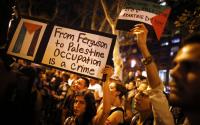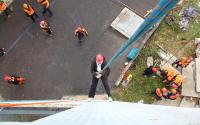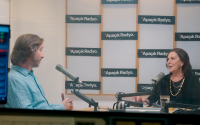Published on Monday, May 16, 2005 by MediaChannel.org |
Outside the window was the great arch of exploration, St Louis's national monument honoring Thomas Jefferson and his patronage of the Lewis and Clark expedition that mapped out our new continent for major change back in the early days of the 18th Century.
In these early days of the 21st century, alongside the banks of the same Mississippi River, two modern day Lewis and Clarks, one a scholar named Robert McChesney, the other a journalist called John Nichols invoked the unfinished promise of Jeffersonian Democracy to convene a second National Conference on Media Reform to energize an emerging citizens movement to explore how to take back our media.
The goal: to redirect the most powerful arsenal of communication technology humanity has ever known from serving corporate interests into the hands of our citizens and public needs.
The organizers had to shut down the registration early because the aptly named Millennium hotel could not accommodate more than the 2500 people who crammed into the 50 or more panels and plenaries to hear calls for action and plan campaigns for media change.
They came from 50 States and 10 countries. They were old and young, white and black, straight and gay, media consumers and media makers, researchers and academics, lawyers and activists. In the words of an earlier exhortation to media combat in the movie Network, they were "mad as hell and won't take it anymore." They didn't just open their windows to shout but came to the conference to exchange ideas.
There were angry hip-hop activists demanding "media justice" and senior citizens alarmed about the current threats to PBS. There were internet savvy advocates of municipally owned wireless systems and senior level 'lions of litigation' who believe that the laws and the courts can be used to safeguard our rights,
There were unknown community media producers and some of the best known voices of liberal left media like radio revolutionaries Al Franken, and Amy Goodman, concerned celebrities like Jim Hightower and Patti Smith, distinguished broadcasters including Bill Moyers and Phil Donahue and two outspoken FCC commissioners, several members of Congress, one CPB board member and probably a partridge in a pear tree,
At times it had the feeling of a revival meeting, not just a rally, It was a million word march to end media concentration and open up the airwaves to more diversity of expression.
Hundreds of groups that care about media change took part from MoveOn to Media Channel, from FAIR to Common Cause; local groups from Chicago Media Action to Seattle's Reclaim the Media and Philadelphia's Media Tank. All gathered under the auspices of Free Press, a relatively new organization that now claims l83, 000 people on it email list,
The small but robust Indy TV channels Link and Free Speech TV and the new emerging news oriented International World Television network in process were also there in a conclave of shared consciousness. Ditto for the Newspaper Guild and AFTRA and the Screen Actor's Guild. Earlier, organizations that claim to represent 20 million Americans endorsed a Citizens Bill of Media Rights to layout the principles guiding the kind of media system that's needed.
Pacifica Radio aired Saturday night's session nationally while CSPAN sent its cameras to record a sermon by Bill Moyers upholding the need for real journalism on PBS and a real PBS. (He glossed over its many flaws but upheld the need for a publicly owned and responsible broadcaster in a time of so much commercialism and corporate media. He demolished the claims of new Corporation for Public Broadcasting Chairman Kenneth Tomlinson that his on-air work needed to be "balanced" with new right-wing fare. "I simply never imagined that any CPB chairman, Democrat or Republican, would cross the line from resisting White House pressure to carrying it out for the White House," he said to continuing applause. (As one would expect major media downplayed the event when they played it at all. One of the speakers was so surprised by the intensity of the event that he blurted out: "I HAD NO IDEA" (that the issue was catching on,)
Most of those in the room were progressive activists although Bob McChesney made it clear that he believes that media is every one's issue and not just a left or partisan concern, While conservatives were conspicuous by their absence, one has the sense that an effort will be made soon to reach out to other constituencies across the partisan divide even as there was clearly uncertainty on how to do that.
One incident illustrated the tension, McChesney asked if the goal was to replace the likes of rightist cheerleader Rush Limbaugh with liberal funnyman Al Franken of Air America, The audience cheered to affirm the proposition. It was then left to McChesney to explain why that was the wrong answer and to explain that media reform will not prevail unless more constituencies can be reached. The crowd listened and cheered his perspective.
Who was there may be less important that what was discussed in workshops where there was a great deal of detail and analysis offered on how to challenge TV and radio license renewals, promote media literacy, advocate for community based wireless, use the internet for media work, petition the FCC, critique media coverage that serves the War in Iraq and unify media reform concerns with campaigns for social justice. It was also clear that those assembled supported indy media makers, (Many films were screened including a packed room for my WMD (Weapons of Mass Deception).
Still missing: an effective follow-up plan to turn all the energy in the room into a more coherent and effective national effort. The focus on grass-roots community-based work has many strengths but also leads to a decentralized do you own 'thingism' that robs reform efforts of a national focus. Many of the attendees left St. Louis left excited but not totally clear on what comes next,
My own suggestion is for a clear and marketable unified umbrella approach akin to the way the right gathered all of its issues and warring factions under the banner of the Contract for America, (Many progressives called it a contract on America). We need a post-pastisan Media and Democracy Act of 2005 to give us a unified platform to unify around. I ran the idea by FCC Commissioner Adelstein who though it had promise. I will flesh out in a subsequent column.
If there is an urgency to turn this "million word march" into a movement of millions of voices, one timely local event drove that home.
The National Media Reform Conference began with organizer John Nichols tribute to St. Louis as the home of famed newspaper man and journalism role model Joseph Pulitzer's Post Dispatch which has served that city for more than l00 years, A day later, it was announced that the paper was being sold to a Midwest chain with a dubious reputation. (The paper has already declined as a story on a neighborhood dispute over paving a driveway had more prominence than the casualties in Iraq.)
While we were meeting the media monolith was marching itself towards more concentration and dumbed-down media outlets.
The clock is ticking on Tom Jefferson's democratic vision. It belongs in the streets not just in an arch and museum.
For more on the conference, visit Freepress.net and http://www.mediageek.org/btm/. You can watch the seessions.
News Dissector Danny Schechter edits Mediachannel.org. His latest film WMD (Weapons of Mass Deception) on the media coverage of the Iraq War was seen at the conference. (See www.wmdthefilm.com)
http://www.commondreams.org/cgi-bin/print.cgi?file=/views05/0516-20.htm






